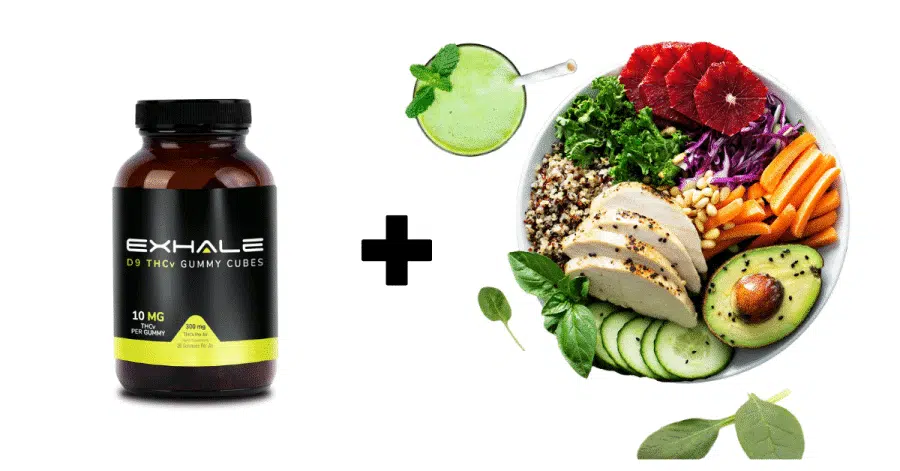In our diverse world, healthy bodies manifest in myriad shapes and sizes, each as unique and varied as the individuals they belong to. While weight loss is certainly not a panacea for every health concern, nor is it a pursuit every person needs to embark on, it might be a goal you're targeting to reach your personal zenith of health.

Embracing a healthier lifestyle often involves various facets, one of the most vital being dietary choices. It's important to remember, though, that significant lifestyle changes should not be made in a vacuum; consult with a healthcare professional before undertaking drastic alterations to your diet or exercise routine.
When weight loss is the objective, a strategic dietary approach can work wonders. The following list provides you with 18 foods that, according to scientific research, can support a healthy weight loss journey. Recently, edibles containing thcv are used by a lot of people to suppress appetite. So, let's delve into the exciting world of nutrition to discover the best allies on your path to optimal health and wellbeing.
#1. THCV Gummies for Weight Loss: An Emerging Trend
THCV gummies, containing the cannabinoid compound THCV, have gained attention as a potential aid for weight loss. Preliminary research suggests that THCV may affect appetite and metabolism, potentially promoting weight loss.
However, it's important to note that the evidence surrounding THCV's specific effects on weight loss is limited, and more research is needed to understand its mechanisms and long-term safety.
If you are considering purchasing THCV gummies for weight loss, it is essential to understand the current legal status and regulations surrounding cannabis and its derivatives in your jurisdiction.
As with any weight loss approach, maintaining a balanced diet, regular exercise, and a healthy lifestyle remain essential for sustainable and overall well-being.
Protein-Packed Powerhouses
Protein-Packed Powerhouses such as whole eggs, lean meats, and tuna are critical for weight loss. High in protein, these foods promote satiety, reducing overall calorie intake. Incorporating these protein-rich options into your diet can support your weight loss journey, helping you feel full while nourishing your body.
#2 Whole Eggs
Whole eggs were once shunned due to concerns about their high cholesterol content. However, this fear was based on misconceptions, as the body intelligently regulates cholesterol levels by sourcing it from the diet or liver as needed.
For individuals with elevated LDL (bad) cholesterol, it’s wise to monitor cholesterol intake. However, for many, consuming 7-12 eggs per week is considered safe and beneficial.
Eggs are a treasure trove of nutrients, with the yolk containing vital nutrients such as choline and vitamin D. Additionally, the whites are protein powerhouses, providing 4-6 grams per egg.
This protein content is particularly crucial for weight management, as tuning into the body’s hunger and fullness cues is integral to maintaining a healthy weight. Consuming protein-rich foods like eggs helps in feeling satiated, thus preventing overeating.
A study involving 50 individuals with higher body weight showed that consuming eggs and buttered toast for breakfast led to increased feelings of fullness over the next four hours compared to a breakfast of cereal, milk, and orange juice.
Researchers found that healthy adults who consumed an egg-based breakfast, rich in protein and fiber, reported higher levels of satiety than those who consumed a low-fiber breakfast.
Ultimately, eggs are an excellent component of a weight loss diet. Their nutrient density and ability to enhance satiety can support weight loss goals while enriching your diet with essential nutrients.
#3. Lean Beef and Chicken Breast
The impact of red meat on heart disease and diabetes risk remains uncertain due to limited evidence. High consumption of red and processed meats is associated with an increased risk of cancer, diabetes, premature death, and heart disease. To lower these risks, it is recommended to consume unprocessed meat in moderation, alongside a diet rich in fruits, vegetables, and whole grains.
Chicken breast and lean cuts of red meat like tenderloin or flank steak offer protein and iron with less saturated fat. Choosing these lean options supports weight management and heart health.
The connection between saturated fat and inflammation is still unclear. However, cooking red meat at high temperatures can produce cancer-causing substances. To minimize this risk, it is advised to limit smoke exposure, remove drippings, and consume lean meat in moderation.
#4. Tuna - A Nutritious and Satiating Protein Source
Tuna is a lean fish that offers a satisfying dose of protein. Its protein content helps keep you feeling full, while also providing healthy fats. Notably, tuna contains docosahexaenoic acid (DHA), an omega-3 fatty acid that has potential heart benefits.
Incorporating fish like salmon and tuna into your diet can be an excellent way to increase your protein intake while benefiting from the nutritious fats that support eye and brain health.
When choosing canned tuna, opt for varieties packed in water if you're watching your calorie intake. Tuna packed in oil, while higher in calories, fat, and sodium, may provide a more filling experience. Consider your specific needs when deciding between the two options.
The Power of Greens and Vegetables
Greens and vegetables possess tremendous power when it comes to nourishing our bodies. Packed with essential vitamins, minerals, and antioxidants, they offer a range of health benefits. Incorporating these nutrient-rich foods into our diet can support overall well-being and contribute to a vibrant and energized life.
#5. The Power of Leafy Greens: Nourishing and Weight-Friendly
Leafy greens like kale, spinach, collard greens, and Swiss chard offer numerous benefits for those aiming to achieve or maintain a healthy weight. Packed with fiber and essential nutrients, these greens help keep you feeling satisfied and well-hydrated.
What sets leafy greens apart is their content of thylakoids, plant compounds that have shown potential for increasing satiety and including supplements to your daily diet aiding in appetite management. Although the studies on this topic are limited and involve small participant groups, the consumption of a 5-gram thylakoid supplement, equivalent to approximately 3.5 ounces (100 grams) of raw spinach, demonstrated promising results.
#6. The Power of Cruciferous Vegetables: Healthy, Filling, and Weight-Loss
Cruciferous vegetables, including broccoli, cauliflower, cabbage, and Brussels sprouts, offer a multitude of health benefits. Apart from being high in fiber, which aids in satiety, they also contain notable amounts of protein—comparatively high for vegetables, although lower than animal foods or legumes.
The combination of protein, fiber, and low calorie content makes cruciferous vegetables ideal for weight loss efforts. These vegetables are not only filling but also highly nutritious, and they contain compounds that have been associated with a lower risk of developing cancer. However, it's important to note that while cruciferous vegetables have potential health benefits, they should not replace recommended cancer screenings or proper cancer treatment.
#7. The Unique Power of Avocados: Healthy Fats and Nutrient Density
Avocados are unique fruits that are high in healthy fats, particularly monounsaturated oleic acid. Despite their high-fat content, they also contain water and fiber, making them filling. Adding avocados to vegetable-based salads enhances the absorption of antioxidants from vegetables. They are nutrient-rich, including fiber and potassium, and help with the absorption of fat-soluble vitamins. However, portion control is important due to their energy density, especially when aiming for weight loss. Being mindful of hunger and fullness cues is key to determining the right amount of avocados for individual needs.
Satisfying Staples: Nourishing and Filling
Certain foods serve as satisfying staples in our diets, providing nourishment and keeping us full. These include protein-rich options like lean meats and legumes, fiber-packed whole grains, and satiating fruits and vegetables. Incorporating these staples ensures a well-rounded and satisfying eating experience.
#8. The Benefits of Boiled Potatoes: Filling and Nutrient-Dense
Boiled potatoes are nutrient-dense and filling, making them an excellent choice for weight loss and overall health. They contain a variety of essential nutrients, including potassium, which plays a role in blood pressure management. Boiled white potatoes rank highest on the Satiety Index, meaning they are particularly satisfying, helping you feel full and nourished.
#9. Beans and Legumes: Nourishing and Fat Burning
Beans and legumes, such as lentils, black beans, and kidney beans, offer valuable benefits for weight loss. These foods are rich in protein and fiber, two nutrients known for promoting satiety and aiding in weight management. Additionally, they often contain resistant starch, which can have positive effects on digestion and blood sugar control.
It's important to note that beans can cause gas and bloating in some individuals due to their high fiber content. However, proper preparation can help mitigate these side effects. Consider purchasing dry beans and soaking them for several hours before cooking to make them more easily digestible and reduce the likelihood of discomfort.
#10. The Power of Whole Grains: Supporting Healthy Weight Loss
Whole grains, such as oats, brown rice, and quinoa, offer valuable support for healthy weight loss. They are rich in fiber and protein, promoting satiety and metabolic health. Oats contain beta-glucans, enhancing satiety, while both brown and white rice can provide resistant starch. Opting for minimally processed whole grains over refined grains is advisable. Moderation is key, and being mindful of portion sizes ensures optimal results in your weight loss journey.
Nutritional Snacks and Add-ons
When it comes to snacks and add-ons, making nourishing choices is important. Opt for nutrient-dense options like fresh fruits, raw nuts, or Greek yogurt for satisfying and wholesome snacks. Enhance meals with flavor using herbs, spices, and healthy toppings like avocado or olive oil for a balanced and enjoyable eating experience.
#11. Cottage Cheese: Protein-Rich and Satiating
Cottage cheese is a protein-rich dairy product that can help increase protein intake for muscle building and satiety. It is also high in calcium. While research is needed to confirm the relationship between calcium intake and weight, cottage cheese, along with Greek yogurt and skyr, provides valuable protein options.
Nuts: Nutrient-Rich Powerhouses
Nuts are nutrient-rich foods that provide protein, fiber, and heart-healthy plant compounds. They make excellent snacks due to their balanced nutritional profile. Studies suggest that nuts can improve metabolic health and promote weight loss. People who consume nuts tend to have better nutrient intake and healthier body weights. Portion control is important when including nuts in your diet for weight management. Start with a handful and assess satiety before consuming more.
Fruit: Nutritious and Weight-friendly
Fruit is considered a healthy food choice by experts, and studies show that those who consume more fruits and vegetables tend to be healthier. Fruits are beneficial for maintaining a healthy weight due to their low energy density, high fiber content, and rich micronutrient profile. While individuals on low-carb diets or with intolerances may need to be cautious, most people can enjoy fruits as a nutritious and tasty part of their weight management journey.
Check this for more recipes: easy recipes using delta 9 thc gummies
#12. Chili Peppers: Spice Up Your Weight Loss Journey
Chili peppers, containing capsaicin, can be a helpful addition to a weight loss diet. Capsaicin may enhance fat metabolism and increase the sensation of fullness, supporting healthy weight loss. While capsaicin supplements are available and may increase metabolism, their impact is modest. It's important to note that tolerance can develop for individuals accustomed to spicy foods. Adding chili peppers to meals can add flavor and potentially aid weight loss, but moderation and personal tolerance should be considered.
#13. Grapefruit: Fiber-rich and Satiating
Grapefruit is a fiber-rich fruit that can promote feelings of fullness. Studies suggest that consuming half a grapefruit before meals may aid weight loss and improve insulin resistance. However, this practice is not sustainable, and a varied diet with fruits and vegetables is recommended. Grapefruit should be avoided when taking specific medications. Further research is needed to understand the effects of grapefruit on weight management.
Innovative Additions
Exploring innovative additions can enhance your culinary journey. Experimenting with unique ingredients, herbs, spices, and healthy condiments can transform a simple dish into a flavorful masterpiece. Whether it's trying new flavors or incorporating creative techniques, embracing innovation adds excitement and depth to your meals.
#14. Delights of Soup: Nourishing and Mindful Eating
Soup can be a nutritious way to increase vegetable and whole grain intake. Mindful eating while enjoying soup promotes satisfaction and prevents overeating. Blending in avocado or cashews adds creaminess without unhealthy fats. Soups hydrate, promote fullness, and can support weight management. Vegetable-based clear soups before meals enhance satisfaction and aid in healthy weight loss.
Final Words
Incorporating a variety of delicious and nutritious whole foods is key to reaching and maintaining a healthier weight. Foods such as fish, lean meat, vegetables, fruits, nuts, seeds, legumes, and gummy oatmeal provide essential nutrients to support your goals.
Recently, a lot of people are switching to having thcv edibles due to it’s benefits. A quicker and easy process to lose weight instantly. Alongside practicing moderation and engaging in regular exercise, these nutritious food choices can pave the way to a healthier life. Embrace the power of whole foods and enjoy the journey towards improved well-being.
The content is intended to augment, not replace, information provided by your clinician. It is not intended nor implied to be a substitute for professional medical advice. Reading this information does not create or replace a doctor-patient relationship or consultation. If required, please contact your doctor or other health care provider to assist you in interpreting any of this information, or in applying the information to your individual needs.



